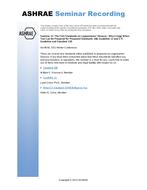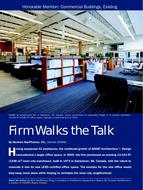The effect of large areas of roof glazing in atrium spaces is assessed using site energy and peak demand loads as performance measures. Special attention is given to the role daylighting plays in the net performance of the glazing system. A detailed thermal transport and daylighting analysis computer program provided data on three aspects of roof glazing performance: (1) the effects of the atrium alone, (2) the atrium and its surrounding dayiighting zone of influence, and (3) the atrium and the coupled building as a whole. The results are presented in terms of comparative performance using a base case building configuration without glazing. The net change in performance due to the inclusion of the roof glazing is systematically evaluated. The results demonstrate the benefits of roof glazing on reducing the lighting energy requirements, and in turn, reducing site energy. These benefits, however, are tempered somewhat by the increased peak demand loads.
Units: Dual
Citation: Symposium, ASHRAE Transactions, 1988, vol. 94, pt. 1, Dallas, TX
Product Details
- Published:
- 1988
- Number of Pages:
- 11
- File Size:
- 1 file , 910 KB
- Product Code(s):
- D-DA-88-05-5


